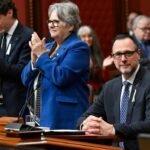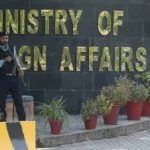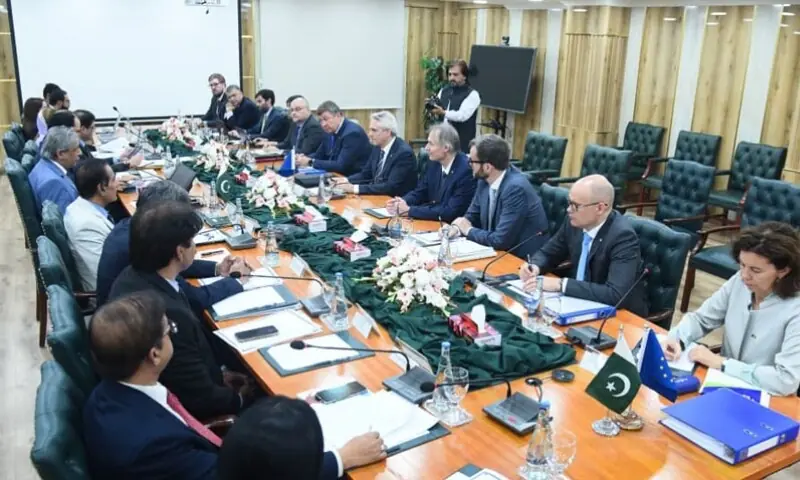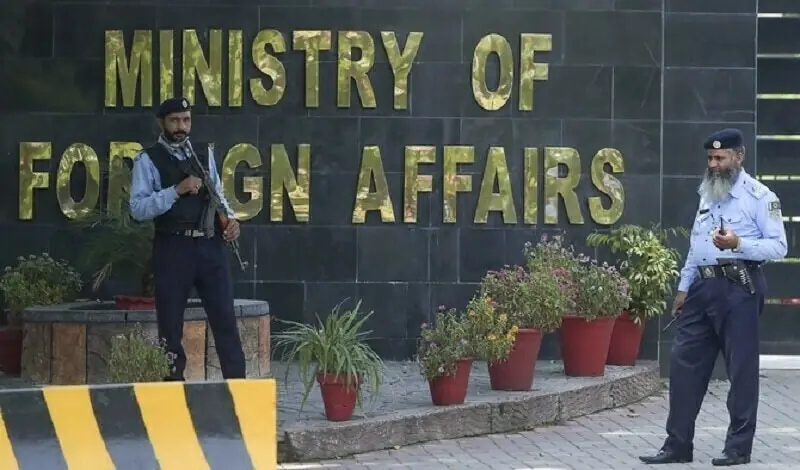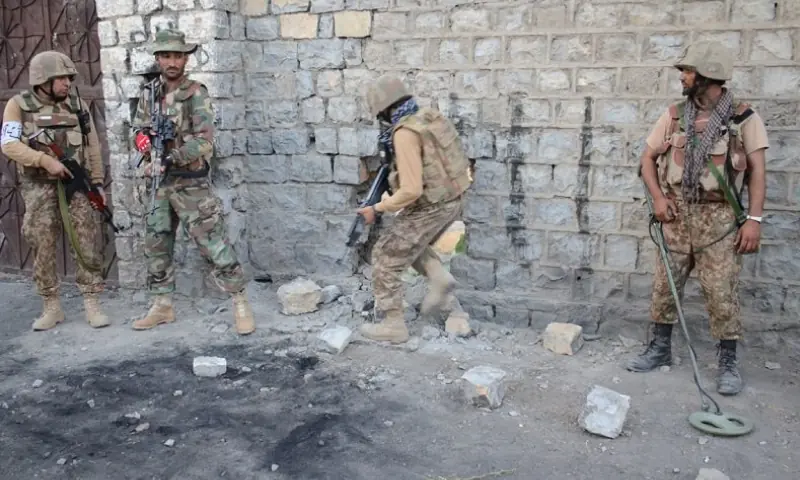Pakistan on Thursday assured the European Union (EU) monitoring mission of its full and complete commitment to the Generalized System of Preferences Plus (GSP+).
The EU granted the country GSP+ status in 2014, resulting in a 108 percent increase in Pakistani textile exports to the EU due to concessional tariffs. In October 2023, the European Parliament voted unanimously extend GSP+ status for another four years until 2027 for developing countries, including Pakistan.
A seven-member EU delegation is visiting Karachi as part of the fifth Biennial Review of the GSP+ scheme. It is directed by Sirgio Baliberia, advisor to the GSP+ Directorate of the General Directorate of Commerce. The monitoring mission will examine Pakistan’s record in 27 international conventions linked to the trade plan. Maintaining GSP+ status is critical for Pakistan to keep export costs low.
A press release issued by the Ministry of Human Rights today said that Minister of Law and Human Rights Azam Nazeer Tarar welcomed the delegation at its headquarters today.
“Pakistan reaffirmed its strong commitment to the GSP+ framework, emphasizing that the Pakistan-EU partnership remains critical for governance reforms, institutional strengthening and sustainable development. As one of the largest beneficiaries of the GSP+, Pakistan highlighted the program’s role in promoting the protection of human rights and the alignment of national legislation with international standards,” the press release said.
The delegation was briefed on “important legislative and policy developments” since 2014, including strengthened protection mechanisms for women, children, workers, marginalized groups and people with disabilities.
The Pakistani side reaffirmed its commitment to uphold human rights despite the “challenges posed by the fight against terrorism and climate change” and highlighted institutional progress with the maintenance of the “A” status of the National Human Rights Commission under the Global Alliance of National Human Rights Institutions and the continued independent functioning of the National Commission on the Rights of the Child (CNRC) and the National Commission on the Status of Women.
The delegation was also informed that the implementation of the National Action Plans on Human Rights and Business and Human Rights was ongoing at the federal and provincial levels.
She was also briefed on key initiatives promoting gender equality, including the National Gender Policy Framework (2022), gender budgeting and provincial measures.
“Flagship programs such as the Benazir Income Support Programme, which benefits over 9.1 million women, and the Prime Minister’s Women Empowerment Package were highlighted as major drivers of women’s socio-economic inclusion.
“Advances in child rights were emphasized, including the establishment of the NCRC, Zainab Alert Agency, Response and Recovery Agency and Child Protection Institutes, along with recent legislation restricting child marriage. Efforts continue to address child labour, online exploitation and out-of-school children,” the press release said.
The Pakistani side further reaffirmed its commitment to freedom of expression and media safety, with the support of the National Commission for the Protection of Journalists and Media Professionals, and provided updates on sensitive human rights measures, including the reduction of capital crimes, the implementation of the Mercy Petition Policy, the implementation of the Torture and Death in Custody Act, and a resolution of more than 85 percent of cases by the Commission of Inquiry on Disappearances. Forced.
Tarar also underlined the country’s “strong constitutional and legal safeguards,” pointing to Pakistan’s recent election to the UN Human Rights Council as a “testimony of the international community’s confidence in its constructive role.”
The press release noted that the delegation highlighted “certain areas that require further attention” regarding human rights in the country and key issues that require government action, including the need for strengthened policies, legislation and strong institutions to effectively fulfill Pakistan’s obligations under the 27 fundamental United Nations conventions.
“The minister assured the delegation that the Government of Pakistan remains fully committed to these obligations and noted that the progress made to date, current challenges and future plans would be shared in detail during the delegation’s ongoing visit.
“The minister welcomed the EU’s constructive suggestions on improving data integration, inter-provincial coordination, treaty reporting and implementation mechanisms. Pakistan has taken these points into account and is advancing progress through strengthened reporting, provincial engagement and robust follow-up,” he said.
The press release concluded by saying that the ministry officials also praised the ongoing cooperation between the EU and Pakistan under the Huqooq-i-Pakistan Project and reaffirmed their commitment to sustaining the progress of GSP+, promoting human rights and promoting an inclusive, sustainable and rights-based future.
SPG+ status is a special incentive given to developing countries to “pursue sustainable development and good governance” in exchange for reducing import duties on two-thirds of their export tariff lines to zero. Governments with this status need to implement 27 international conventions on human rights, labor rights, good governance and the environment.
Pakistan and the EU last week underlined the importance of further deepening trade and investment ties, including through the GSP+ scheme, as an engine of sustainable growth, export diversification, job creation and mutually beneficial economic opportunities.
At the beginning of that weekEU ambassador to Pakistan Raimundas Karoblis had said the country needed to “do more” in terms of meeting its commitments under the GSP+ scheme ahead of a review.
